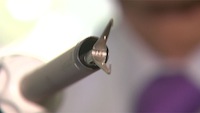
Laparoscopic power morcellators are currently being investigated regarding their potential risk in spreading cancerous tumors in women. The device is intended to break up larger, benign tumors and remove them in smaller pieces as a minimally invasive procedure. However, undetected malignant tumors could cause serious complications by spreading cancerous cells. This prompted the FDA to warn against the use of the device, and a worldwide recall by Johnson & Johnson, one power morcellator manufacturer. The FDA estimates a 1 in 350 chance of a woman having undiagnosed uterine sarcoma while getting surgery for fibroids.

Power morcellation is still being debated and investigated as a procedure for removing fibroids. Some doctors suggest performing the procedure within a bag that is used to capture the fluids and stop the spread of cancerous materials. The bags, however, can tear and limit the visibility of the surgeon. Also, education and training about the use of these devices is lacking.
There are multiple options available for treatment of fibroids and other gynecological treatments. You should consult a medical professional about the best options for you before making any decisions or changes in your medical treatment.
Lopez McHugh attorneys have an extensive history medical device and malpractice litigation. If you or a loved one have had a hysterectomy or surgery to remove uterine fibroids and were later diagnosed with cancer of the abdomen, pelvis, or have been diagnosed with metastatic leiomyosarcoma, you should contact a morcellator lawyer immediately to discuss your situation. An attorney will be able to investigate type of device used in your surgery, and determine if that device played a role in the spread of your cancer.
Lopez McHugh product liability attorneys have a long history of helping injured individuals obtain justice against big companies. Contact us here via our website using the form to the right or call (877) 737-8525.
